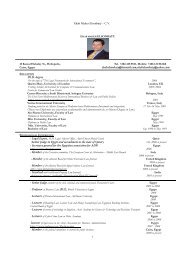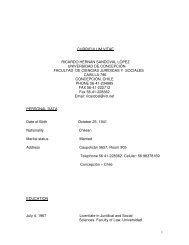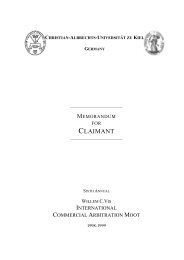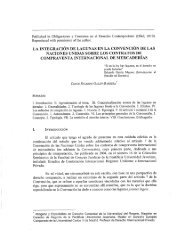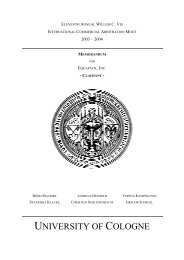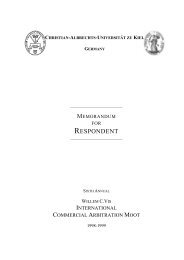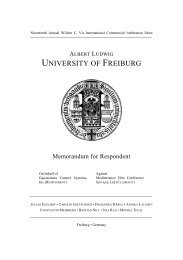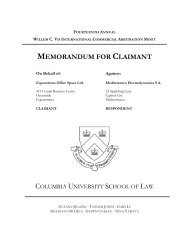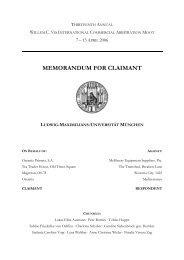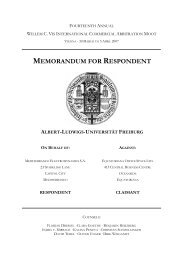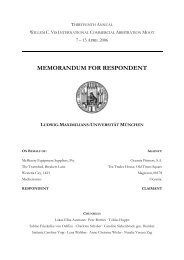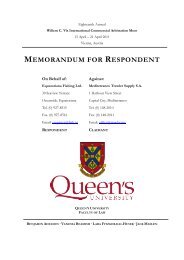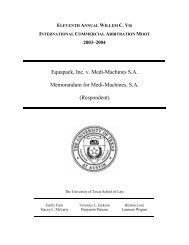MEMORANDUM FOR RESPONDENT - CISG Database
MEMORANDUM FOR RESPONDENT - CISG Database
MEMORANDUM FOR RESPONDENT - CISG Database
Create successful ePaper yourself
Turn your PDF publications into a flip-book with our unique Google optimized e-Paper software.
46. JS type fuses are functionally identical to JP type fuses for use up to 400 amperes<br />
[Respondent’s Exhibit 1]. The fuse boards delivered under the Contract were likely of equal<br />
value because the JS type fuses used were of similar prices or the same price as JP type fuses<br />
[Respondent’s Exhibit 2]. They were probably of the same quality since they were also<br />
manufactured by Chat Electronics [Procedural Order No. 2, Clarification 26]. The<br />
distribution fuse boards were therefore perfectly suitable for connection to the electricity<br />
supply, and thus of equal utility.<br />
2. The Respondent had no obligation to adhere to any Equatoriana public<br />
law requirements, much less Equalec’s policy, which was neither a<br />
public law requirement nor a term of the Fuse Board Contract.<br />
47. Equalec’s unreasonable requirement that only JP type fuses be used for below 400<br />
amperes was not a term of the Fuse Board Contract. The phrase “lockable to Equalec<br />
requirements” was the only reference to Equalec. As the Claimant explains, this phrase<br />
referred to the fuse boards being securable by padlock so that Equalec would have exclusive<br />
access to the fuses and fuseways inside [Statement of Claim, para. 8; Procedural Order No.<br />
2, Clarification 21]. There was no indication that Equalec would have the special policy of<br />
not supplying electricity where JS type fuses were used for below 400 amperes [Procedural<br />
Order No. 2, Clarification 23]. The Claimant also could not have intended [Article 8 <strong>CISG</strong>]<br />
for the phrase to mean that the fuse boards must adhere to Equalec’s policy, since even Mr.<br />
Konkler did not know at the conclusion of the contract that Equalec had implemented such a<br />
policy [Statement of Claim, para. 15; Claimant’s Exhibit 3; Claimant’s Exhibit 4]. Since the<br />
policy was not within the contemplation of the Claimant, the Claimant could not have<br />
intended for the policy to be a contractual requirement. The Respondent was therefore not<br />
contractually bound to deliver goods complying with Equalec’s peculiar requirement.<br />
48. Furthermore, Article 35 of the <strong>CISG</strong> does not require sellers to deliver goods<br />
conforming to the public law regulations in the buyer’s country [Mussel Case (Germany);<br />
Schlechtriem, Bundesgerichtshof; Kruisinga, p. 43-52]. In view of the uncertain legal<br />
situation in the buyer’s country, the buyer cannot assume the seller to have clear knowledge<br />
and corresponding competence in this respect [Schlechtriem, Bundesgerichtshof].<br />
17



